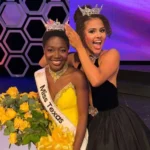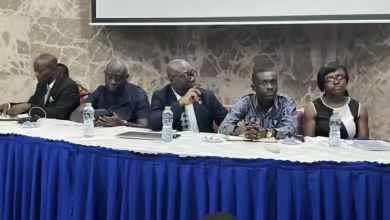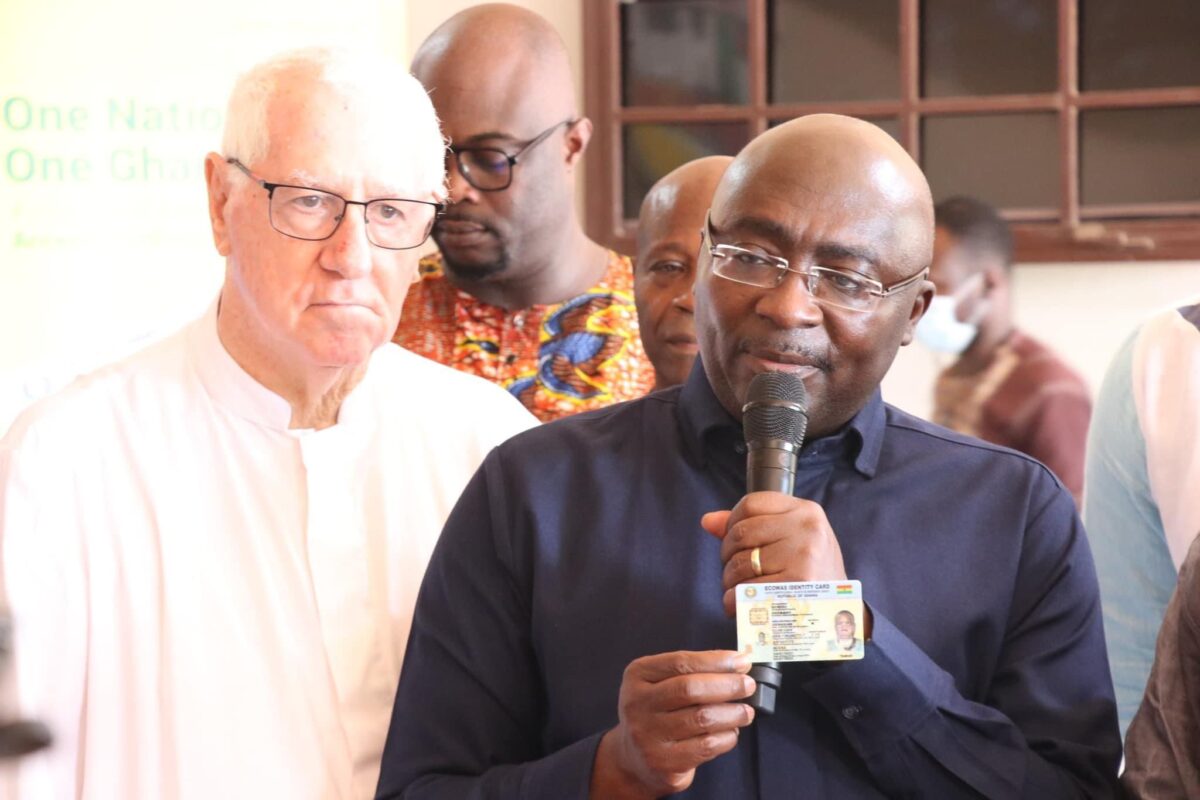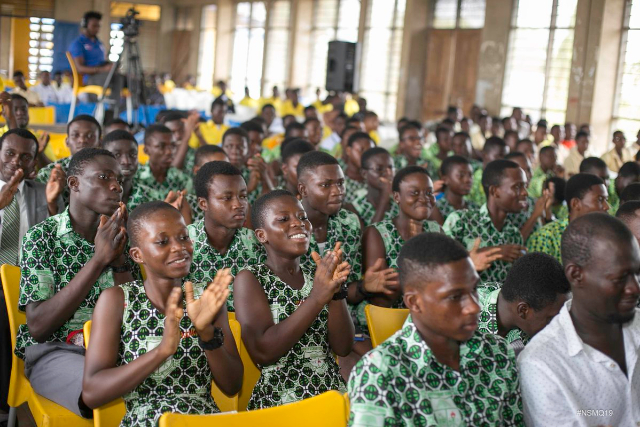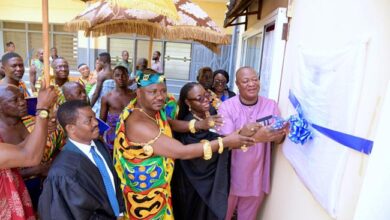Meet the first woman to graduate from the University of Ghana with a PhD in mathematics.
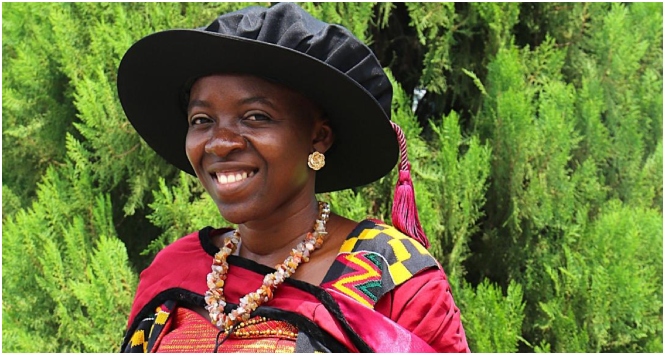
Meet the first woman to graduate from the University of Ghana with a PhD in mathematics.
Dr Gloria Agyeiwaa Antwi Botchway has achieved a significant milestone for the University of Ghana by becoming the first female PhD recipient in mathematics. This achievement breaks down barriers, dispels gender stereotypes, and motivates upcoming generations of female mathematicians in a traditionally male-dominated field.
Dr. Botchway’s journey from the Oti region’s Akaa Buem village to being the first woman to graduate with a PhD in mathematics from the University of Ghana in Legon is proof of her tenacity and willpower.
She is the second child of her parents and was born into a family of four. Her family had severe problems when they relocated to Accra for her mother’s schooling. They shared a property with an aunt who was struggling to make ends meet, and life’s troubles were clearly visible.
“I recall selling items like fish and yams as well as fresh water. In an interview with the Public Affairs Directorate News Desk, she said, “I loved anything that had to do with business and accounting, so even though it was challenging, I enjoyed it.”
She welcomed the experience even though her mother was worried about the risks of selling by the side of the road.
Her time in school was equally difficult. Dr. Botchway frequently packed leftover banku, which she and her brother would conceal to prevent bullying, while her peers brought a variety of delicacies to school. “In the morning, we do the pepper. There were usually no fish. Because we didn’t want anyone to see what we were eating, we hid under the stairway. Just to buy food for my little brother, I would go hungry myself. She remarked, “I felt responsible for him,” emphasising the sacrifices she made during those trying times.
The family relocated to Asamankese after four years in Accra, where she went the Life Preparatory School. She attended University Primary on North Campus after relocating to Winneba once more.
She had to adjust to multiple teaching methods and curriculum due to these frequent moves—six schools in all during her basic education—which presented special difficulties and caused her to “not like science” because different subjects were covered at each school.
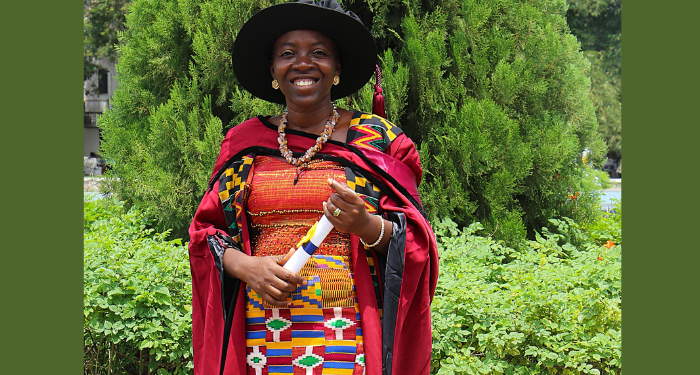
The family frequently shared a small room with many relatives, making living conditions challenging. She remembers being crammed into a small, less-than-private room in Winneba with her mother and brothers. “It was difficult, but we managed with what we had,” she remarked.
Crime and instability characterised her time in Accra, where she frequently witnessed police clashes and gunshots from local gang members. “That area used to be raided by the police.” You hear gunfire. Additionally, there were a lot of individuals in the cramped rooms. We all gather outside to sleep on the compound in the evening.
In spite of these challenges, Dr. Botchway’s resolve never wavered. Due to budgetary limitations, she was unable to purchase new clothing, thus she finished her elementary schooling in the same uniform from class four through junior high school. “Life hasn’t been easy; it’s been challenging,” she said.
Nevertheless, despite everything, her mother was a constant source of encouragement, making it possible for Dr. Botchway to finish her education. “My mother has supported me as well. She continued to work while pursuing her PhD. She made time for me and gave me a lot of encouragement, even though she wasn’t retired, she added.
Gloria switched to high school at Accra Girls, where she first concentrated on business courses before realising that mathematics was her actual love. “I’ve always had a passion for maths. It pushes me, and I wanted to work in an area where not many people went,” she remarked.
Her maths instructor in high school saw her talent and encouraged her to go into academics. She recalls, “He just told me that you have to be a lecturer, Gloria.” Together with her natural enthusiasm for the topic, this support put Dr. Botchway on the course that would eventually lead her to make history.
Her journey to the University of Ghana, where she not only achieved academic success but also paved the way for upcoming generations of female mathematicians, was motivated by her enthusiasm. She first chose a course in business administration when she started at the University of Ghana, but she soon decided on mathematics.
She eventually decided to pursue mathematics after being encouraged by mentors such as Dr. Adu Gyamfi and Prof. Elsie Kaufmann, who gave her advice on the benefits of obtaining a degree in the field. She clarified, “I wanted a field that was hard and few people went into.” She continued, “I realised that I could still pursue accounting if I wanted to with a maths degree.”
Maths is difficult. “It’s not simple,” she acknowledges. “But you would do it if you loved it.”
The absence of female role models in her field was one of the biggest obstacles. Gloria says, “People don’t expect you to continue with the maths.” “They were really discouraging at times.” But these uncertainties only strengthened her will to achieve.
Dr. Botchway characterised Justine Johnson, his colleague, as a practical, motivated, and ambitious person in an interview.
He spoke about her ability to lead and how she assisted in starting a study group for math, which improved his math skills. “Nothing is impossible, and she always strives to solve problems,” he said, praising her tenacity.
Mr. Johnson explained how she approaches group projects with motivation. He claims that she urged everyone to contribute by posing various queries for everyone to consider and, if necessary, offering the answer.
Another set of difficulties was juggling her personal life and academic ambitions. Dr. Botchway was married during her master’s course and had two children before graduation.
During her doctoral studies, she had two more children. She attributes her ability to manage her many responsibilities to her family and her understanding spouse, saying, “Life has to go on.”
“My spouse has been incredibly helpful. He would actually enquire, “What have you done?” innumerable times. He would enquire, “Today, what did you do?” despite the fact that he has no concept what I’m doing.
Dr. Botchway’s mother, Mrs. Margaret Aduam, describes how she and other family members helped her along the way. Since I realised that getting a PhD was not at all simple, I was actually constantly there for her. In order to give her time to study, I occasionally bring all of her kids to my place. We also offered her emotional support and prayer. I reassure her, “Gloria, you can do it,” when she’s feeling exhausted.
With everyone in Jasikan thanking Gloria and even urging her to come home, the family is thrilled and proud of her accomplishment. They are pleased with her achievement and the joy it has generated in the neighbourhood,” Mrs. Aduam continued.
Dr. Botchway’s persistence paid off in 2024 when she graduated from the University of Ghana with the first female PhD in mathematics. In addition to being a personal victory, this accomplishment marks a critical turning point for gender representation in Ghanaian STEM disciplines.
She is committed to inspire the upcoming generation of female mathematicians and leaving a lasting impression in her area now that she has earned her PhD.
The goal of Dr. Botchway’s project, “Enhancing M in STEM,” is to enhance secondary school mathematics instruction for girls.
Regarding her research objectives, she states, “I want to be able to see Maths being applied to something relevant.” “This goes beyond theory; we are actually resolving actual issues.”
Her goals go beyond just doing research. She says, “I’m definitely aiming for professorship,” with the goal of being the first female maths professor at the University of Ghana. She gives this advise to young women who are thinking about pursuing a career in mathematics: “Don’t let what people say stop you.” Don’t let your surroundings deter you. Actually, don’t allow yourself to quit.
Gloria’s accomplishment is significant, according to Professor Deborah Atobrah, Director of the University of Ghana’s Centre for Gender Studies and Advocacy (CEGENSA). This is a huge accomplishment. It’s a significant accomplishment for STEM women’s work. But we believe that it has taken us too long to arrive at this point. However, we continue to commemorate this significant accomplishment,” she remarked.
She also emphasised the difficulties that girls encounter in STEM subjects, with rural areas receiving less recognition because of lower educational attainment. “A decline in the value of education and a lack of employment opportunities have exacerbated the perception of women in STEM fields.”
She recommended that financial aid be tailored to meet the unique needs of female students in order to address concerns about women’s education, particularly in STEM fields. Furthermore, ensuring PhD holders have access to these opportunities may inspire more women to pursue them, advancing professional advancement and gender equality.
She praised Dr. Botchway and her work ethic in an address to Dr. Chisara Peace Ogbogbo, the head of the mathematics department. She is a very serious woman with a very serious outlook on life. I have to admit that she takes her responsibilities quite seriously. She is among the individuals in this department that I can trust. “I am confident that Gloria will fulfil any task I ask of her,” she stated.
Additionally, by offering scholarships to female teachers to study mathematics, Dr. Ogbogbo urged the government to intentionally encourage girls to seek jobs in the field. In order to take a daring step towards accomplishing the M in the STEM project, which will help alter the current quo and inspire girls to seek careers in maths, she continued, the government must confer with the Department.
Dr. Botchway has demonstrated tenacity and perseverance throughout her academic career, which prepared the ground for her historic accomplishment. Her tale is one of tenacity, embodying the spirit of a woman who overcame adversity to accomplish historic achievement.
Being the first woman to receive a PhD in mathematics from UG is an incredible accomplishment because she chose to remain in her native country instead of going abroad, which makes her a unique individual. About Dr. Botchway’s accomplishment, JisLord Naaa Ablorh, a level 200 Mathematics student, stated, “So, this inspires a lot of people to not just run, causing brain drain, but stay here and do your best.”
In her expressions of gratitude, Dr. Botchway gives thanks to God for guiding her through everything. She also expressed gratitude to Professor Anthony Yaw Aidoo of Eastern Connecticut State University, her supervisor, for his encouragement during her doctoral studies. She expressed gratitude to the University of Ghana and her department for offering a supportive environment and waiving costs.
She also thanked Professor Seba, Dr. Ogbogbo, and Dr. Twum for their contributions to the trip. She received financing from Carnegie Corporation through Professor Yaa Ntimoa-Baidu’s Carnegie Next Generation of Academics, Africa and Banga project. Additionally, Dr. Botchway expressed gratitude to her family for their support, particularly to her mother, Madam Margaret Aduam, and her husband. She also expressed gratitude to her friends for their unselfish assistance during their trip.
Stories like Dr. Botchway’s are both inspirational and a call to action as Ghana works to boost the number of women in STEM areas. Her journey from the Teshie market booths to the University of Ghana lecture halls shows that obstacles can be overcome and new avenues opened with perseverance, encouragement, and access to education.



